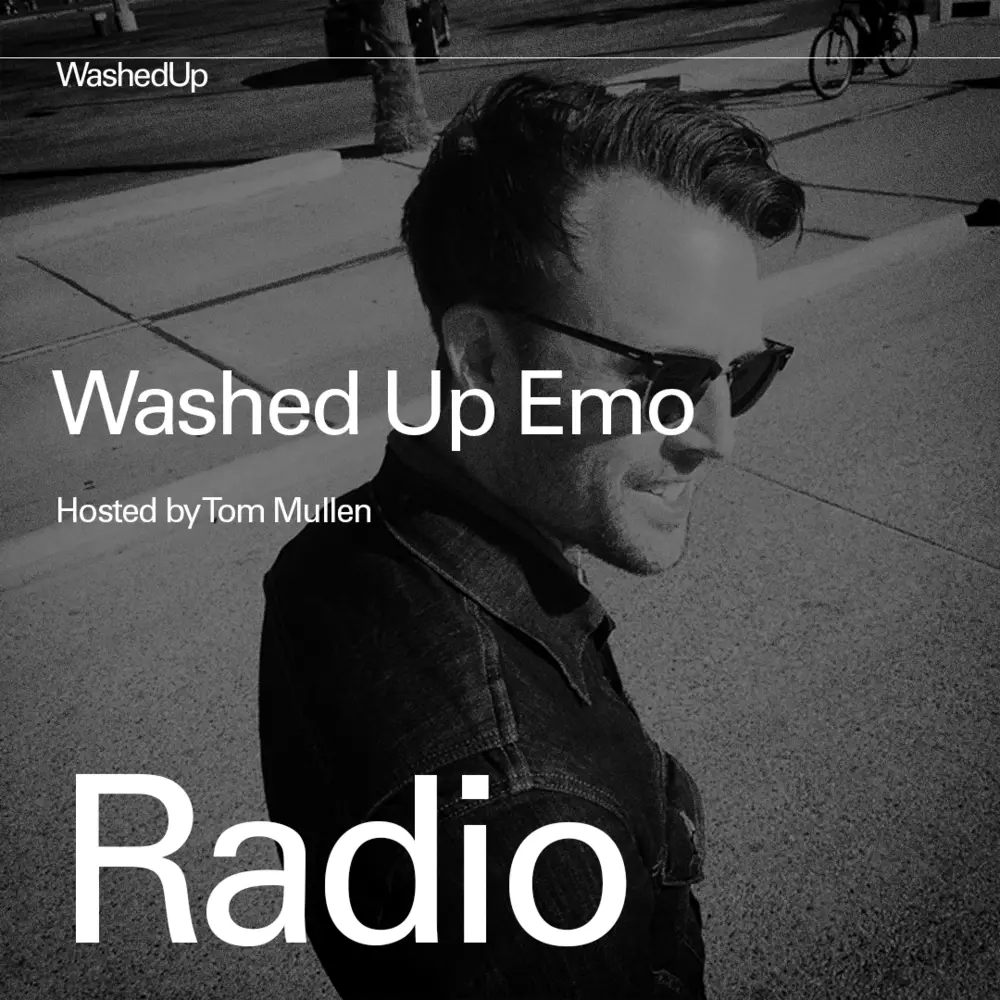
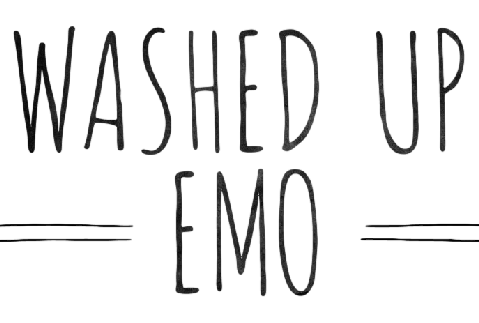
Emo. To some, it’s become akin to a four-letter word. But why? Is it over-commercialization? A simple matter of (bad) opinion bred in bad taste? It’s hard to say, but what I do know is I personally love Emo. I grew up with Taking Back Sunday, The Get Up Kids, Brand New, Jimmy Eat World, and more.
As I’ve gotten older, I discovered more incredible Emo bands like Sunny Day Real Estate, The Promise Ring, Jets To Brazil, Hospital Grade, and Knapsack. The genre is endless, more so, it’s endlessly awesome. Any genre, at any given time, can get a bad rep, but I’m here to tell you today that Emo is awesome. No genre should ever be defined by the worst of it, or its most overplayed. Doesn’t seem to make a whole lot of sense to me. I don’t think it makes a whole lot of sense to Tom Mullen either, as he’s devoted the last 13 years to giving us the facts on Emo with his blog/podcast, Washed Up Emo. He’s also just finished up his second anthology as well. If you’re into Emo — you want to check that out.
Tom brings knowledge and passion to the table, and with those tools, he combats the stigma and general ignorance that is unfairly hurled at this great genre. Tom has devoted an insurmountable amount of energy toward his goal of bringing a positive light to the word “Emo.” He’s done a lot to bring positive, deserved awareness and attention to bands people thought were gone, but Tom provides the airwaves to prove otherwise. Cheers to you Tom! It’s nice to connect with others who are doing it like we are!
If you would like to learn more about Washed Up Emo, you can over to Tom’s website here, and you can download his podcast from wherever you get your podcasts from. Good talk. Cheers.
Andrew:
Tom, thank you for taking the time to speak with us. It’s been some year, hasn’t it? What have you been doing to keep your mind off the ever-raging dumpster fire?
Tom:
What a year. You are right there. I took the sudden shift in the world to focus on finishing the 2nd volume of my self-published Anthology of Emo series. The book series, interviews transcribed directly from the podcast, was a blast to do the first one and I thought, let’s reprint the sold-out 1st volume, which sold out and do another. It was such a blast to do and really helped while everyone has been locked down. I also found out everyone was home, including many people I had wanted to interview over the years, so it’s been great to catch up with so many of my heroes.
Andrew:
Tell us a bit about your backstory? How did you get into music?
Tom:
I grew up in a small town in Vermont and just devoured music. Being from a small place, not many bands came through and I relied on many of the mainstream media that many kids did in the early 90s. Two things changed my life early on. Seeing Nirvana and Helmet on MTV. I got a guitar instantly and realized there was more out there. Indie labels, distros, scenes, etc. The other thing was finding out about a venue called 242 Main in Burlington, VT. Started by Bernie Sander’s wife while he was mayor, it was modeled after the teen centers in Europe that Jane saw during her travels in Europe and brought it back to Burlington. The place turned into a place to hear different music, voices, and meet others around that state. It was the start of me understanding there was this amazing world outside of the mainstream and I haven’t stopped searching for that next unknown band.
Andrew:
As a writer, who are some of your earliest influences?
Tom:
I’ll be honest, I’m not a writer. I am more a medium for these stories to get to a wider audience. The book is transcriptions so I consider myself an editor and curator. I will say, books are a huge influence on me and my dad was always supportive of reading and finding books you loved. I wouldn’t have put together a book of these stories from the podcast if not for my dad.
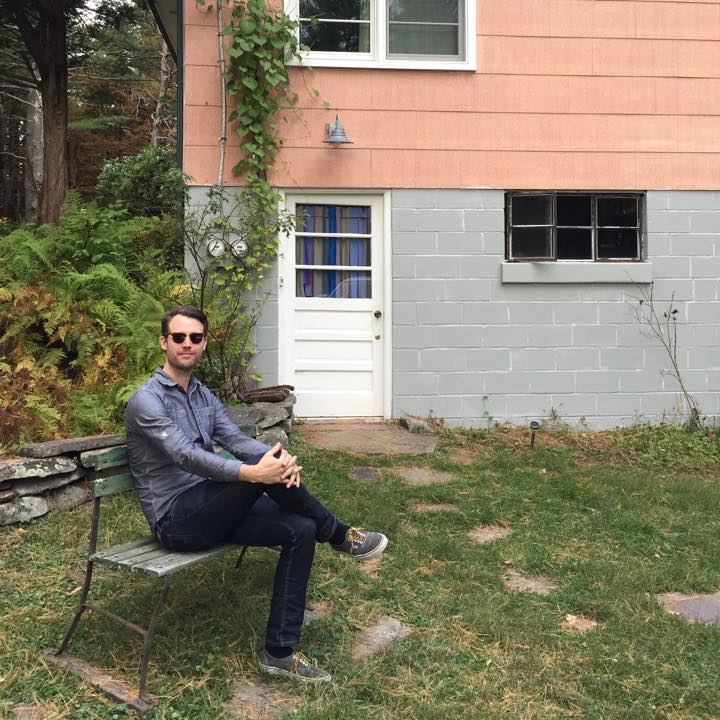
Andrew:
Tell us the story of Washed Up Emo. What are its origins and how did it grow into what it is today?
Tom:
I was angry one day in 2007 while working at Equal Vision Records. Just disgusted at the coverage of the term Emo and decided that day to start a blog talking about bands that no one talked about online. Literally, there weren’t articles about Sunny Day Real Estate or Elliott, etc. It was a deluge of deep V-neck shirts, white belts, and hair. The first few years were pretty funny as I was just venting and then slowly I realized that people shared the same view. I stepped it up by starting a DJ night in February of 2011 with some friends that predate the Emo night boom of 2014 by 3 years, then that October, starting the podcast. I didn’t know of any podcast out there at the time interviewing my heroes and I said to myself that I should just do it. I’ve always done it as a hobby and for fun. There’s no money in it for me as I have a day job so I’m a fan first. Being able to talk to my heroes, tell their stories, and then have the next generation find out about is always the goal. I still hold that feeling to this day and I’ll never stop.
Andrew:
When I was in high school, I grew up with The Get Up Kids, Knapsack, Brand New, and more, but as time wore on something weird happened to the scene. It became kind of a parody of itself almost. What are your thoughts on that?
Tom:
The boom of Emo was really interesting because there are always going to be bands that get forgotten and artists from an era that will be mentioned more than others. What’s interesting about Emo is the stank that the word has had on it since it was uttered in DC as “Emocore.” The word has had many eras and phases and to anyone holding a candle on one is frivolous. The word will constantly evolve and the weird timing is when it hit the mainstream in the mid-2000s. That time was when it was mass audiences and huge stadiums and arenas for a word that sorta got dragged through the mud. Those bands are still big and continue to garner attention. The issue is the general public will laugh when hearing the word Emo or chuckle. It’s not their fault, they’ve only seen that brief period and thought it was gone. The genre hasn’t left, the word hasn’t gone away and that’s a testament to the artists continuing to be partly influenced by many bands before them. My only goal of this site and my work is for someone to hear the word Emo and not smirk or laugh and give it the respect it deserves, regardless of the era.
Andrew:
I kind of feel like after the genre bottomed out and became over-commercialized; a lot of the OG bands almost went into hiding and got lumped in with all that. I never felt that was fair. Those early bands were legit.
Tom:
Bands definitely went under and even before that in the late 90s, they did too. Now the Emo revival era is saying, “Nah not me.” It’s quite a cycle that continues because of one four-year period that seems to dominate the thought about the word. You can only try and educate and just as you’re not going to get everyone on board with such a mass audience aware of something, you hope you can pull a few out and just as I had been exposed growing up in Vermont. There’s someone out there finding out about it today and I hope they stumble upon my site or podcast and realize it’s more than the mid-2000s. I won’t win most likely, those giant bands have huge followings and need to pay the bills but maybe someone watching that goes and dives a little deeper. We can only hope.
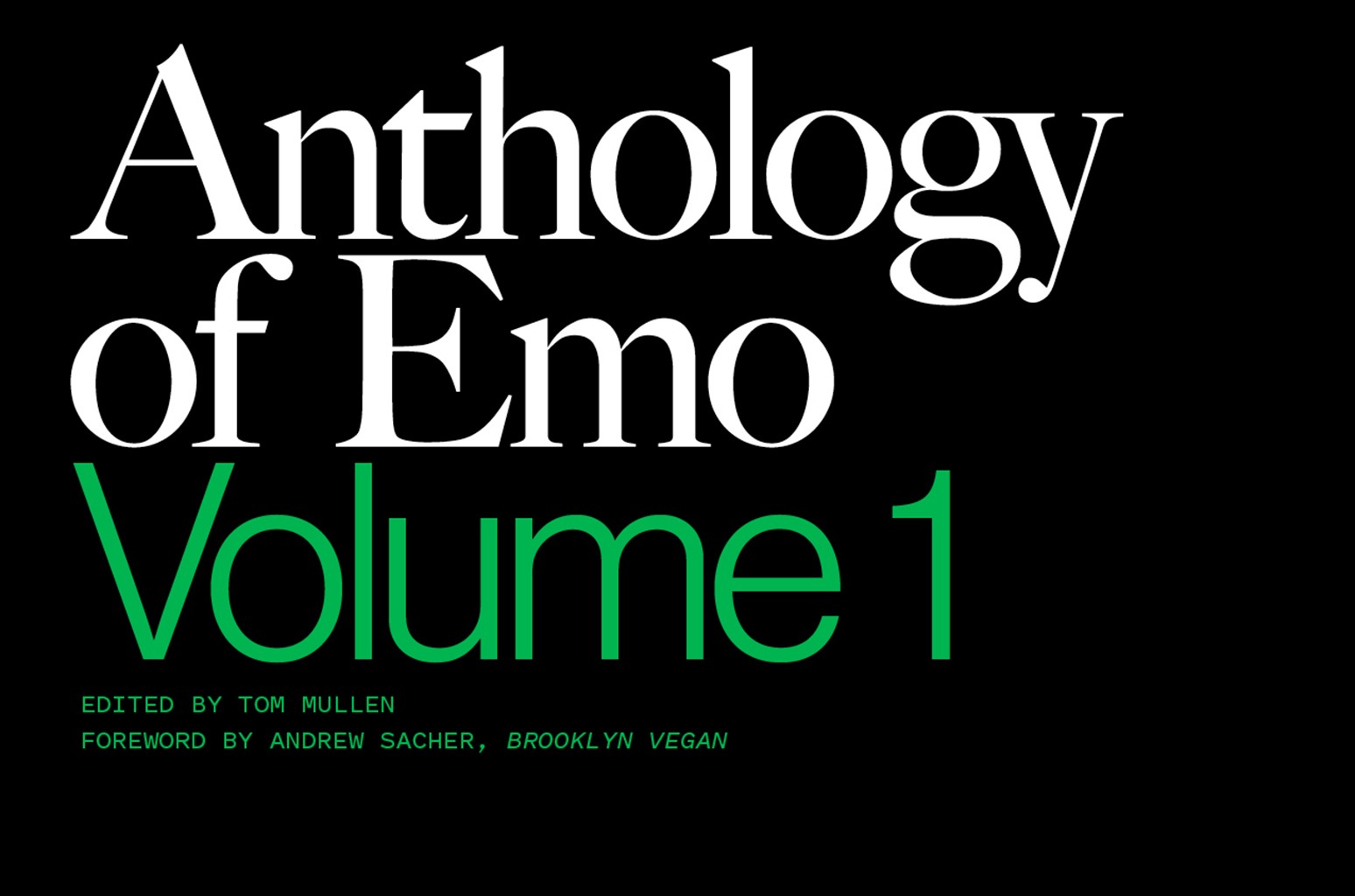
Andrew:
Tell us about your podcast. Is it still running strong? You’re kind of like the Marc Maron of Emo.
Tom:
I wish I had the paychecks like Maron. The podcast has been such an enjoyable experience for many reasons. I get to talk to my heroes, help them with their current projects, and have a conversation with them that they can’t have with many people. I don’t just write about this and other things, I literally just focus on this era and I was at the shows, working at the labels, friends with many of the bands and labels already. They can instantly become comfortable with me faster and can say whatever they want without having to explain. It’s a never-ending mountain and I’m so happy I started early before the boom of shows. I don’t really think I’ll ever stop. I’m at 180 episodes and have countless people I want to talk to and hear their stories.
Andrew:
Let’s talk about your anthology series, Anthology of Emo. There are two volumes now, right? How did that project get started? What is the end game goal for it?
Tom:
Yes, two volumes of interviews are taken directly from the podcast. I wanted to find a way to have my podcasts reach a different audience than someone hearing me talk to people. The book was a fun way to get something serious and reach someone that may not listen to podcasts or know about Washed Up Emo. It was such a blast to do and they’re a shitload of work to be completely honest. I loved self-publishing and learning how to make a book from scratch. The end goal is just to keep doing them. I barely make any money after printing and expenses. So it’s really getting enough cash to do it again.
Andrew:
Let’s switch gears a bit now. Tell me your thoughts on the current state of the music scene these days? In your opinion, what’s it like out there for an Indie/Emo artist?
Tom:
I love new music. I open up my email and see submissions from around the world with all sorts of influences. I listen to everything and I know this feeling of discovery will never stop. The scene, aside from the pandemic issues, is alive and well. Great music will rise to the top when you work hard and make the music for yourself. I remember being at Equal Vision and hearing the demos, and every single band was just trying to be Circa Survive or Coheed and Cambria. We don’t need another one of those, so make your own noise. Start the next wave or trend, don’t just follow. Doing what you love, regardless of who is responding on social media is super important. Don’t get caught up in the chase for likes or hearts. There is only one heart you should be trying to chase, your own.
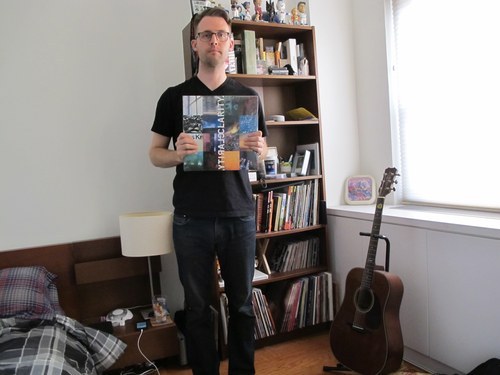
Andrew:
Are you into vinyl? Tapes? CDs? Or are you all digital now? Where do you like to shop for music?
Tom:
I’ve got a nice collection of vinyl from over the years but it’s super small compared to other people I guess. I only get vinyl if I’m going to listen to it and always laugh at people that get different colors or variants of a record. I get it. It’s fun but I want to listen to it. I acquired a ton in college as well as an insane amount of CDs while in college working at the radio station. At one point, after moving to NYC and working in music, I think my collection ballooned to over 5,000. I took one holiday break at my parents years ago to digitize everything and recycle seventy-five percent of the CDs. I only kept things that weren’t on streaming services or were just things I’d never listen to. It’s all digitized and I have 3 backups to all the digital music as well. When I shop for music, I love to order online from the small guys or a distro and always would take a trip to local shops in NYC or LA whenever I would be in either city for work or just a weekend trip to the East Village or Hollywood. I work in music, so the combination of having friends send you stuff and access to stores in both cities while just being in town or working was pretty awesome. I feel pretty damn lucky to have the collection I have.
Andrew:
What are a few albums that mean the most to you and why?
I was three days into college as a freshman and went up to the radio station to see how I could get a show. The music director at the time was super nice to me and at the end of our chat, he offered me the chance to go through the giveaway bin of music and take whatever I wanted. Let me tell you, he had no clue what was in there and I almost fell over. This bin essentially started my collection of Emo. One record in there was the first pressing of Static Prevails from Jimmy Eat World and a bunch of 7”s of theirs as well from a promo company at the time called AAM, that did a Sunday Service mailing of obscure and smaller run stuff. I couldn’t believe it. Another would be a signed first pressing of the first record from The Killers. I had just moved to NYC and worked at a marketing company that had a digital department, which at that time was pretty revolutionary. One of the first albums I worked on was that album and got to see them at really small venues around NYC. I don’t remember how I got it but I’ll always cherish that record because it was part of my first real industry job 1000 years ago. I’d say the last one would be my Helmet and Jimmy Eat World vinyl collections. I have 99% of the things they put out over the years and it’s awesome to look back and all the great stores, trades, and people I met while collecting those two bands. I’ve even gotten to meet both bands over the years and yea, as a kid from Vermont dreaming of these things, it’s quite mind-blowing.
Andrew:
Once COVID-19 is finished with us, what’s next for you?
Tom:
I really see this time as an opportunity to prioritize what’s important in your life and focus. Everyone would always talk about being busy or waiting for that next tour, release, etc. Now with things on hold, it’s time to reset, find what really makes you happy, and explore that. I think there is an insane amount of bad that has come from this but we will rise out of this or we’ll never be over this pandemic. We will be adjusting our way of life for many years to come. I think those that take this time to realize that and look at not holding onto what is but looking forward to what you can be doing. Specifically, I’ll be diving into more podcasts, radio shows, books outside of the Anthology of Emo series, and reissues of records long lost before we had cell phones next to us at every moment. This dream of legitimizing the word Emo will probably be something I’ll do alongside my day job for the rest of my life.
Andrew:
Last question. You’ve been doing this for 13 years now. Looking back, how much satisfaction have you gotten out of it? What are some of your fondest memories? Who are your favorite interviews you’ve done?
Tom:
It’s been absolutely insanity to think about and I think what’s so satisfying about it is that persistence pays off. Many people talk about doing a book, starting a podcast, writing for a blog and few keep going. I really think it took a while for people in the industry, bands, etc to realize that. I now can text or call my favorite bands in the entire world and while keeping it cool, help them or connect them with other people. I am happy to be the medium and one of the curators of the scene to help it get to the next era and a group of people to carry that on. I don’t want anyone to remember me, I just want the music remembered and if I have a small part in that, I’ve done my job. Some of my fondest memories are too numerous but definitely, one is getting asked by a band to help them pick openers for a tour. Pinch me. I’ve had an absolute blast meeting people from around the world that found the podcast or the books and said how much they enjoyed them. I didn’t know that was going to happen when starting but it took a long time. To me, this isn’t a meme, a viral tweet, or anything like that. This is important and more meaningful to have memories that aren’t always public or to get clout. I really feel privileged to be able to help tell these stories with the artists and I don’t take that lightly.
There are many interviews that are my favorites for many reasons. One that sticks out to me because I just put it in the latest volume of the book series is Jon Bunch. He sang for a bunch of hardcore bands and most notably, Sense Field. He passed away and I happened to have done his last ever interview. I had to re-edit it before releasing it and I heard from his wife that his son loved hearing it. When the 2nd volume of the book came around, I knew I wanted that in there to have something for his son to be able to read forever. I literally did the second volume for one family. If I had only sold one book to them, then it would have been worth it. She wrote to me recently and said how much the book meant to the family and his son. I’m not sure I can top that.
Dig this interview? Check out the full archives of Vinyl Writer Interviews, by Andrew Daly, here: www.vinylwritermusic.com/interviews
